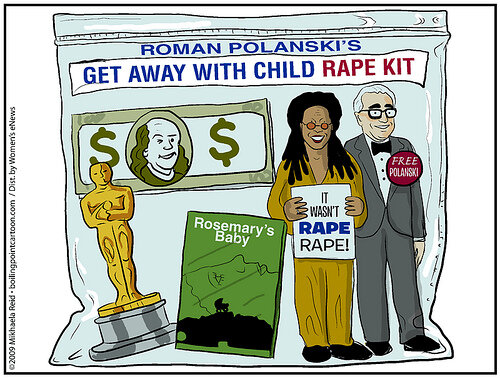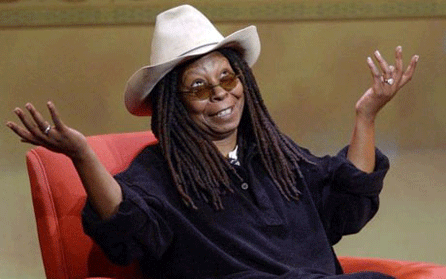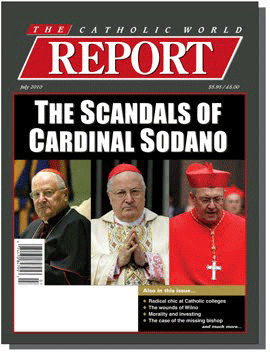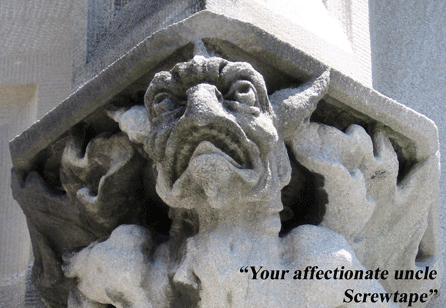Roman Polanski, Father Marcial Maciel, and the Eye of the Beholder
 The Swiss government refused to extradite Roman Polanski to face American justice while the Father Marcial Maciel affair has evoked a "McCarthy Era" form of "justice" in the Catholic Church.Last October, in "The Whoopi Cushion," I wrote of the case against film director Roman Polanski. It was a controversial look at the vast difference in media treatment of Roman Polanski and claims against Catholic priests. I titled the post for actress and comedienne Whoopi Goldberg who issued the most dubious media sound bite in the entire Polanski affair: "It wasn't really rape rape."
The Swiss government refused to extradite Roman Polanski to face American justice while the Father Marcial Maciel affair has evoked a "McCarthy Era" form of "justice" in the Catholic Church.Last October, in "The Whoopi Cushion," I wrote of the case against film director Roman Polanski. It was a controversial look at the vast difference in media treatment of Roman Polanski and claims against Catholic priests. I titled the post for actress and comedienne Whoopi Goldberg who issued the most dubious media sound bite in the entire Polanski affair: "It wasn't really rape rape."

Ms. Goldberg, like many in the entertainment industry who were horrified by the arrest of Roman Polanski, argued that the case against him was from too long ago to be adjudicated fairly in the American justice system, and Polanski should be set free. Many of the same commentators - Whoopi Goldberg among them - have applied a polar opposite argument to claims against Catholic priests, many of which are from the same time period as the case against Mr. Polanski.You may have noticed - though it got little attention - that Swiss authorities freed Roman Polanski last month. The Swiss government denied the request of Los Angeles prosecutors to extradite Polanski for drugging and raping a 13-year-old girl in 1977 and then fleeing the country before facing sentencing.The Washington Post reported in July that the decision not to extradite Polanski "constituted a victory not only for Polanski but also for a broad array of European intellectual and political figures who had come to his defense ...." This is an interesting development given what the Pope and other Church officials have faced in the European press in recent months.I wonder how many Catholic priests have been sent to American prisons on less evidence than that which convicted Roman Polanski in cases that are just as old or older.In "Pop Stars and Priests" I quoted from a similar question raised by The Wall Street Journal's Daniel Henninger when Los Angeles prosecutors were poised to lose their case against another pop icon, Michael Jackson in 2005 ("Pushing the Envelope - Michael Jackson: A Freaky Culture's Peter Pan," June 3, 2005):
"[Prosecutor] Tom Sneddon may lose this case. If so, it will be because Mr. Jackson, like Kobe Bryant, was able to mount a defense equal to the accusatory powers of the state. Not everyone can do that. If Michael walks, I'll wonder if any of the many convicted Catholic priests similarly charged were in fact innocent but found guilty because they couldn't push back against the state's relentless steamroller."
I wrote a letter to Daniel Henninger after that column appeared in The Wall Street Journal. I thought he made a crucial point about Michael Jackson's defense relative to - say - my own, but some factors were missing. This was the gist of what I wrote:
"As a priest without the means to push back in equal measure to Michael Jackson, I must point out some factors you overlooked.Imagine how steeply uphill Michael's battle would have been if twenty years passed between the alleged crime and the state's prosecutorial steamroller rumbling into action for a trial. Imagine the state having to prove nothing while Michael Jackson's defense tried in vain to prove that something alleged to have happened two decades earlier never happened at all.Then imagine Michael Jackson struggling to proclaim his innocence while the institution he served denounced him and his attempts to defend himself, seeking only the path of least resistance to settle with his accusers and rid themselves of liability at the expense of due process.Imagine all of this, and you will have captured the scene faced by many similarly accused Catholic priests."
The above is no exaggeration. I am serving a 67-year prison sentence for a crime alleged to have occurred within five years of the case against Roman Polanski, but the charge against me never took place at all. If you think it's self-serving to maintain that, you have no idea how this system works. I would have left prison thirteen years ago had I been guilty and willing to say so.MORE TRANSPARENCY FROM THE BOSTON GLOBEPerhaps the most telling American media response to the Swiss Government's decision not to extradite Roman Polanski last month was an editorial in The Boston Globe. The Globe devoted a paltry two inches at the bottom of its July 14th Editorial Page to a pathetic and nearly invisible declaration that freeing Polanski "sends a disturbing message about how money and celebrity can supersede morality and justice." If the size of the Globe's editorial on the Polanski case is a measurement of how "disturbed" the news media is over the example it sets, Mr. Polanski and the film industry have nothing to fear from American justice.What would be the media response if it was the Vatican, and not the government of Switzerland, refusing to extradite the accused in a thirty year old claim? Do you think that would merit a two-inch editorial buried in The Boston Globe?I cannot help but recall what just befell 8O-year-old Father Dominic Menna whose life was left in ruins after the emergence of a claim some twenty years older than that against Roman Polanski. with no evidence at all beyond the word of someone who stands to gain a financial windfall from making the claim, the Globe's coverage of the Father Menna case was far more visible than its squeamish editorial on Mr. Polanski and his friends in Switzerland.

One pundit argued in defense of the media response to Roman Polanski's case that the claims against priests are seen differently - "because the entertainment industry doesn't have the influence on children and young people that the Catholic Church has." The argument left me speechless, so I'll just let it speak for itself.FATHER MARCIAL MACIEL AND A CATHOLIC McCARTHY ERAWriter Ryan A. MacDonald has been a contributor to These Stone Walls, and more recently to Our Sunday Visitor, the Catholic World Report, and Homiletic & Pastoral Review. My post, "The Whoopi Cushion" generated some interesting comments, but Ryan made an important point which I’ll quote in its entirety:
“ ‘And to keep me from being too elated …. a thorn was given me in the flesh, a messenger of Satan to harass me. Three times I besought the Lord about this, but he said to me, ‘My grace is sufficient for you, for my power is made perfect in weakness.’ (2 COR 12: 7-8).Imagine the Church receiving evidence today that St. Paul’s cryptic “thorn in the flesh” was a sexual compulsion. Would there be talk of removing his image from our walls? Would a movement form to expunge his words from the Canon of Scripture? The story of sex abuse allegations against priests, some true and many obviously not, is indeed a stain on the image of the Catholic priesthood, but should the Body of Christ, the Church, allow Her critics to equate the efficacy of Her message with the character of Her messengers?Does God call flawed and sinful men and women to be instruments of His grace? Clearly. Does God weigh each of our lives solely in the harsh light of our most egregious sins? Let’s hope not, despite the fact that in the Internet age we do this routinely to one another, and especially to our religious icons.I read with horror the part of this post about a bishop ordering the remains of a priest to be exhumed and moved from a Catholic cemetery after he was posthumously accused. I thought this must be an isolated response by a U.S. bishop until I recently read the Boston Globe article (10/20/09) about the Bishop of Portland, Maine doing something very similar.Fr. Joseph McGowan died in 1962 at the age of 72. The bishop read a letter to parishioners at one parish stating that Fr. McGowan was accused of abuse between 1936 and 1949. According to the Globe article the bishop “directed the removal of any memorials or tributes to [Father] McGowan, including a photo and a plaque at the church.” The bishop also directed the Knights of Columbus to remove the priest’s name from its charter. The person accusing Fr. McGowan in a demand for settlement claimed to be 15 years old at the time of the alleged abuse, and is now 78.The knowledge of these abuse claims brings me to only one place: the truth that I, too, am a sinner who comes to Christ through the Church for redemption. With a modicum of honest self-assessment instead of a stone at the ready, it is a truth at which we would all arrive. For my part, I have no stones to throw at any accused priest. I have only sadness that the bishops who once supported them now heed calls to purge the Church of any trace of them.No doubt, the Puritan founders of American Protestantism would approve of the purging of the priesthood that is now underway in Western culture, for it is far more Calvinist than Catholic.”
Ryan's point is made ever more clear by the supporters of Roman Polanski, and it could be especially applied to the troubling matter of Father Marcial Maciel Degallado and the Legionaries of Christ.In the June/July issue of First Things, editor Joseph Bottum has a well-written column entitled “The Cost of Father Maciel.” Mr. Bottum cited at length" a not-so-very-well written investigative report by writer Jason Berry that appeared - not at all surprisingly - in two April issues of The National Catholic Reporter. In First Things, Mr. Bottum acknowledged that Jason Berry "didn't quite have the story he wanted," and that his investigative journalism was "fumbling" and "thinly sourced." Unfortunately, none of that stopped Mr. Bottum from quoting the Jason Berry report that draws a nasty case of guilt by association against Cardinal Angelo Sodano, Dean of the College of Cardinals. Edward Pentin, writing from Rome in the July issue of The Catholic World Report, raised the same guilt by association charges against Cardinal Sodano citing both the First Things piece and Jason Berry's "fumbling" NCR report.As I wrote in a 2005 Catalyst article, "Sex Abuse and Signs of Fraud," Jason Berry appeared on "The Geraldo Show" on November 14, 1988 to ridicule Catholic dioceses and bishops in an episode entitled "The Church's Sexual Watergate."Jason Berry "exposed" in 1988 the very same sex abuse claims, secret archives, and cover-ups by bishops that he and others claimed to expose again in 1994 and again in 2002. Mr. Berry appeared on "Geraldo" with Attorney Jeffrey Anderson who, as I pointed out in "Catholic Scandal and the News Media," has vowed to "sue the sh--" out of the Catholic Church "everywhere." But for Jason Berry, of course, guilt by association applies in only one direction.Ryan MacDonald posted a thoughtful comment on the First Things website in response to Joseph Bottum's "The Cost of Father Maciel." Ryan raised another important point. Father Marcial Maciel was the subject of investigation after investigation that went on for years - even decades. He never had any shortage of detractors ready to stand up and allege any number of moral failures attributed to him. Father Maciel survived all these investigations until the bitter end when he was "invited to lead a reserved life of prayer and penitence."How is it, then, that only after Father Maciel's death - when he is no longer here to answer for any of it - does "solid" evidence surface to defame him, his work, his order, and now even his known associates like Cardinal Sodano?I cannot help but wonder what the true agenda is in the one-sided, postmortem, and shocking revelations in the story of Father Marcial Maciel. There was a hint of this agenda in a long, well-researched article by Alma Guillermoprieto who writes on Latin America for the New York Review of Books ("The Mission of Father Maciel," June 24, 2010). Guillermoprieto cited Jason Berry's long investigations of Maciel as one of her primary sources, but nowhere in the long article did she even mention Cardinal Sodano.In the article, Father Maciel is accused of any number of moral failures from plagiarism to fathering children only to sexually abuse them. The writer, however, at least pointed out in a footnote that some of the most serious testimony about Maciel has been "tarnished somewhat by the revelation that [the accusers] had earlier demanded millions of dollars from the Legionaries of Christ in exchange for their silence."In the world in which I now live, that's called "extortion" and it's a crime.WHO'S HAVING THE LAST LAUGH?But Ms. Guillermoprieto raised a target beyond money. She went to great lengths to point out repeatedly that Father Maciel founded "the most morally conservative" order in the modern Church. not to mention "the distressing question of the Church's last pope, the popular John Paul II and his relations with the demonic priest."Perhaps the true target isn't Father Maciel at all, or even the Legionaries of Christ.Guillermoprieto's conclusion? "Catholics who always identified their priests with Bing Crosby will need some time to adjust ....” No doubt, that much, at least, is true. As I pointed out in “Going My Way,” Bing Crosby’s famous “Father O’Malley” would not survive the age of suspicion."Are you now, or have you ever been a member of the Communist Party?" The question sends chills down the spines of people who still recall Senator Joseph McCarthy. His four-year reign as Chairman of the Committee on Unamerican Activities from 1950 to 1954 coined such terms as "McCarthyism" and "guilt by association" to describe what is now widely touted as a classic modern day witch hunt.Consider this picture: the international film industry along with media and political figures throughout Europe have rallied around Roman Polanski declaring that he has suffered exponentially for his ancient offenses. and insisting that "justice" would be served only by his freedom from the tyranny of the American justice system and its focus on revenge. Meanwhile, Cardinal Sodano and a host of others are on the verge of being blacklisted in the Catholic Church for their past associations with Father Maciel, known, postmortem, for a pattern of moral failures.Roman Polanski was only arrested at all because he ventured to Switzerland when the film industry bestowed on him the accolade of one of its highest awards last year: the Zurich Film Festival's Lifetime Achievement Award. Meanwhile in Boston last month, 8O-year-old Father Dominic Menna was rendered virtually homeless, his reputation in ruins, because of a single uncorroborated claim from fifty-one years ago. Father Menna has been forced out of ministry and out of his home pending an investigation that will likely last longer than the 80-year-old priest has years left on this earth.After being freed from house arrest by the Swiss government last month, Roman Polanski made his first public appearance to the cheers of supporters at the Montreux Jazz Festival where his current wife, Emmanuelle Seigner, was performing. When I asked a brother priest of my diocese for basic information that might help my case last year, he wrote, "I cannot help you and do not see the need for any further correspondence from you." (See "Kill the Priest Again!").Since his 1977 conviction for child sexual assault, Roman Polanski has won three Academy Award nominations and a 2002 Oscar for Best Director. Meanwhile in our own backyard, Catholics are now pitted against Catholics. Bishops are bullied into shunning their priests. Cardinals are sniping at each other in public, and the mere taint of association may cost one of the highest ranking Catholic Church officials his reputation and career.
Unfortunately, none of that stopped Mr. Bottum from quoting the Jason Berry report that draws a nasty case of guilt by association against Cardinal Angelo Sodano, Dean of the College of Cardinals. Edward Pentin, writing from Rome in the July issue of The Catholic World Report, raised the same guilt by association charges against Cardinal Sodano citing both the First Things piece and Jason Berry's "fumbling" NCR report.As I wrote in a 2005 Catalyst article, "Sex Abuse and Signs of Fraud," Jason Berry appeared on "The Geraldo Show" on November 14, 1988 to ridicule Catholic dioceses and bishops in an episode entitled "The Church's Sexual Watergate."Jason Berry "exposed" in 1988 the very same sex abuse claims, secret archives, and cover-ups by bishops that he and others claimed to expose again in 1994 and again in 2002. Mr. Berry appeared on "Geraldo" with Attorney Jeffrey Anderson who, as I pointed out in "Catholic Scandal and the News Media," has vowed to "sue the sh--" out of the Catholic Church "everywhere." But for Jason Berry, of course, guilt by association applies in only one direction.Ryan MacDonald posted a thoughtful comment on the First Things website in response to Joseph Bottum's "The Cost of Father Maciel." Ryan raised another important point. Father Marcial Maciel was the subject of investigation after investigation that went on for years - even decades. He never had any shortage of detractors ready to stand up and allege any number of moral failures attributed to him. Father Maciel survived all these investigations until the bitter end when he was "invited to lead a reserved life of prayer and penitence."How is it, then, that only after Father Maciel's death - when he is no longer here to answer for any of it - does "solid" evidence surface to defame him, his work, his order, and now even his known associates like Cardinal Sodano?I cannot help but wonder what the true agenda is in the one-sided, postmortem, and shocking revelations in the story of Father Marcial Maciel. There was a hint of this agenda in a long, well-researched article by Alma Guillermoprieto who writes on Latin America for the New York Review of Books ("The Mission of Father Maciel," June 24, 2010). Guillermoprieto cited Jason Berry's long investigations of Maciel as one of her primary sources, but nowhere in the long article did she even mention Cardinal Sodano.In the article, Father Maciel is accused of any number of moral failures from plagiarism to fathering children only to sexually abuse them. The writer, however, at least pointed out in a footnote that some of the most serious testimony about Maciel has been "tarnished somewhat by the revelation that [the accusers] had earlier demanded millions of dollars from the Legionaries of Christ in exchange for their silence."In the world in which I now live, that's called "extortion" and it's a crime.WHO'S HAVING THE LAST LAUGH?But Ms. Guillermoprieto raised a target beyond money. She went to great lengths to point out repeatedly that Father Maciel founded "the most morally conservative" order in the modern Church. not to mention "the distressing question of the Church's last pope, the popular John Paul II and his relations with the demonic priest."Perhaps the true target isn't Father Maciel at all, or even the Legionaries of Christ.Guillermoprieto's conclusion? "Catholics who always identified their priests with Bing Crosby will need some time to adjust ....” No doubt, that much, at least, is true. As I pointed out in “Going My Way,” Bing Crosby’s famous “Father O’Malley” would not survive the age of suspicion."Are you now, or have you ever been a member of the Communist Party?" The question sends chills down the spines of people who still recall Senator Joseph McCarthy. His four-year reign as Chairman of the Committee on Unamerican Activities from 1950 to 1954 coined such terms as "McCarthyism" and "guilt by association" to describe what is now widely touted as a classic modern day witch hunt.Consider this picture: the international film industry along with media and political figures throughout Europe have rallied around Roman Polanski declaring that he has suffered exponentially for his ancient offenses. and insisting that "justice" would be served only by his freedom from the tyranny of the American justice system and its focus on revenge. Meanwhile, Cardinal Sodano and a host of others are on the verge of being blacklisted in the Catholic Church for their past associations with Father Maciel, known, postmortem, for a pattern of moral failures.Roman Polanski was only arrested at all because he ventured to Switzerland when the film industry bestowed on him the accolade of one of its highest awards last year: the Zurich Film Festival's Lifetime Achievement Award. Meanwhile in Boston last month, 8O-year-old Father Dominic Menna was rendered virtually homeless, his reputation in ruins, because of a single uncorroborated claim from fifty-one years ago. Father Menna has been forced out of ministry and out of his home pending an investigation that will likely last longer than the 80-year-old priest has years left on this earth.After being freed from house arrest by the Swiss government last month, Roman Polanski made his first public appearance to the cheers of supporters at the Montreux Jazz Festival where his current wife, Emmanuelle Seigner, was performing. When I asked a brother priest of my diocese for basic information that might help my case last year, he wrote, "I cannot help you and do not see the need for any further correspondence from you." (See "Kill the Priest Again!").Since his 1977 conviction for child sexual assault, Roman Polanski has won three Academy Award nominations and a 2002 Oscar for Best Director. Meanwhile in our own backyard, Catholics are now pitted against Catholics. Bishops are bullied into shunning their priests. Cardinals are sniping at each other in public, and the mere taint of association may cost one of the highest ranking Catholic Church officials his reputation and career.
There is something wrong with this picture. And there is one ominous figure who is taking it all in from his place in the shadows, having the laugh of his long, dark life. As I wrote in 'The Eighth Commandment," the climb upward for those falsely accused is very steep. I know all too well "The Cost of Father Maciel" for he has made my climb all the more treacherous.Joseph Bottum mentioned in passing Father Richard John Neuhaus' misinformed (but in my opinion, courageous) giving of the benefit of doubt to Father Maciel when they both lived. Without real evidence - and there was none then - it's what Christians are supposed to do. Father Neuhaus gave that same benefit of doubt to me. I miss his courage, and the sense of justice that came with it.

